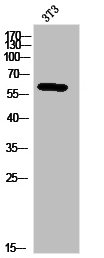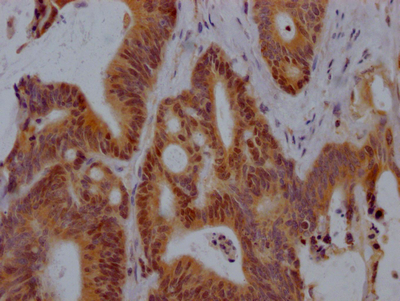PAK2 Antibody
产品详情
-
Uniprot No.:Q13177
-
基因名:
-
别名:C-t-PAK2 antibody; CB422 antibody; EC 2.7.11.1 antibody; Gamma PAK antibody; Gamma-PAK antibody; hPAK65 antibody; Kinase antibody; p21 (CDKN1A) activated kinase 2 antibody; p21 (CDKN1A)-activated kinase 2a antibody; p21 activated kinase 2 antibody; p21 protein (Cdc42/Rac)-activated kinase 2 antibody; p21 protein Cdc42 Rac activated kinase 2 antibody; p21-activated kinase 2 antibody; p21-activated kinase; 65-KD antibody; p21-activated protein kinase I antibody; p21CDKN1A activated kinase 2 antibody; p27 antibody; p34 antibody; p58 antibody; p65PAK antibody; PAK 2 antibody; PAK-2 antibody; PAK-2p34 antibody; Pak2 antibody; PAK2_HUMAN antibody; PAK65 antibody; PAKgamma antibody; S6 H4 kinase antibody; S6/H4 kinase antibody; Serine threonine protein kinase PAK 2 antibody; Serine/threonine protein kinase PAK 2 antibody
-
宿主:Rabbit
-
反应种属:Human,Mouse,Rat
-
免疫原:Synthesized peptide derived from Human PAKγ around the non-phosphorylation site of S192.
-
免疫原种属:Homo sapiens (Human)
-
标记方式:Non-conjugated
-
抗体亚型:IgG
-
纯化方式:The antibody was affinity-purified from rabbit antiserum by affinity-chromatography using epitope-specific immunogen.
-
浓度:It differs from different batches. Please contact us to confirm it.
-
保存缓冲液:Liquid in PBS containing 50% glycerol, 0.5% BSA and 0.02% sodium azide.
-
产品提供形式:Liquid
-
应用范围:WB, IHC, ELISA
-
推荐稀释比:
Application Recommended Dilution WB 1:500-1:2000 IHC 1:100-1:300 ELISA 1:5000 -
Protocols:
-
储存条件:Upon receipt, store at -20°C or -80°C. Avoid repeated freeze.
-
货期:Basically, we can dispatch the products out in 1-3 working days after receiving your orders. Delivery time maybe differs from different purchasing way or location, please kindly consult your local distributors for specific delivery time.
相关产品
靶点详情
-
功能:Serine/threonine protein kinase that plays a role in a variety of different signaling pathways including cytoskeleton regulation, cell motility, cell cycle progression, apoptosis or proliferation. Acts as downstream effector of the small GTPases CDC42 and RAC1. Activation by the binding of active CDC42 and RAC1 results in a conformational change and a subsequent autophosphorylation on several serine and/or threonine residues. Full-length PAK2 stimulates cell survival and cell growth. Phosphorylates MAPK4 and MAPK6 and activates the downstream target MAPKAPK5, a regulator of F-actin polymerization and cell migration. Phosphorylates JUN and plays an important role in EGF-induced cell proliferation. Phosphorylates many other substrates including histone H4 to promote assembly of H3.3 and H4 into nucleosomes, BAD, ribosomal protein S6, or MBP. Additionally, associates with ARHGEF7 and GIT1 to perform kinase-independent functions such as spindle orientation control during mitosis. On the other hand, apoptotic stimuli such as DNA damage lead to caspase-mediated cleavage of PAK2, generating PAK-2p34, an active p34 fragment that translocates to the nucleus and promotes cellular apoptosis involving the JNK signaling pathway. Caspase-activated PAK2 phosphorylates MKNK1 and reduces cellular translation.
-
基因功能参考文献:
- Overexpression of PAK2 in oral squamous cell carcinomas may be associated with an advanced pathology grade. PMID: 29714078
- the promotion of apoptosis by human cytomegalovirusmiRUS45p in cells was specifically mediated via inhibition of PAK2 expression. PMID: 28765936
- leukaemic cells explicitly require PAK2 to grow towards an extracellular matrix. PAK2-deficient cells fail to form colonies in methylcellulose and to induce lymphomas in vivo. PAK2 might therefore be the critical isoform in leukaemic cells by controlling tumour growth PMID: 28707321
- Results show that PAK2 kinase plays an alternative anti-apoptotic role, phosphorylating caspase-7 and promoting unfettered cell growth and chemotherapeutic resistance. PMID: 27889207
- We found that overexpression of miR-137 inhibited the proliferation of melanoma cells, which could be phenocopied by knockdown of PAK2 using siRNAs. PMID: 26186482
- PAK2 is a direct effector of TSC1-TSC2-RHEB signaling and a new target for rational drug therapy in TSC. PMID: 26412398
- Nef exploits PAK2 in a stepwise mechanism in which its kinase activity cooperates with an adaptor function for the exocyst complex to inhibit host cell actin dynamics. PMID: 26350970
- Cytoplasmic Pak2 may promote cell proliferation in normal endometrium during menstrual cycle. PMID: 26218748
- Further analyses show that HDAC6 may promote growth of GBM cells through inhibition of SMAD2 phosphorylation to downregulate p21 PMID: 26150340
- Findings indicate that repression of microRNA miR-134 and consequent up-regulation of p21-activated kinase 2 (Pak2) might contribute to paclitaxel resistance. PMID: 26363097
- Inhibition of PAK activation at late G2-phase centrosomes caused by Rac1 inactivation coincides with impeded activation of Aurora A and the CyclinB/Cdk1 complex and delayed mitotic entry. PMID: 24840740
- Results identified Pak2 as a possibly important mediator of ovarian cancer cell migration on extracellular matrix. PMID: 25050916
- PAK2 activation may be associated with advanced tumor progression and poor prognosis of gastric cancer PMID: 24621074
- Prostasin repress cancer cells and contribute to chemoresistance by modulating the CASP/PAK2-p34/actin pathway. PMID: 24434518
- s demonstrate that HIV-1 Nef expression mediates phosphorylation of Mek1 on serine298 and Pak2 on serine192/197 in T cell lines as well as primary human T cells. PMID: 23746211
- thrombin induces monocyte/macrophage migration via PAR1-Galpha12-dependent Pyk2-mediated Gab1 and p115 RhoGEF interactions, leading to Rac1- and RhoA-targeted Pak2 activation. PMID: 24025335
- PAK2 negatively modulate TGF-beta signaling by attenuating the receptor-Smad interaction and thus Smad activation PMID: 22393057
- Low-to-moderate penetrance protein coding mutations or non-coding mutations at DLG1 and/or PAK2, or a nearby gene, may reproduce the behavioral characteristics of the 3q29 microdeletion. PMID: 21850710
- The ability of Nef to associate with PAK2 correlates with the ability to enhance HIV-1 replication. PMID: 21819585
- highly expressed PAK2 mediates chemotherapeutic resistance in human breast invasive ductal carcinoma by negatively regulating caspase-7 activity PMID: 21555521
- High PAK2 is associated with melanoma. PMID: 21177766
- Mechanistic studies of the autoactivation of PAK2: a two-step model of cis initiation followed by trans amplification. PMID: 21098037
- analysis of evolutionary conserved residues that are crucial for the catalytic activity of PKA and Pak2 PMID: 20209159
- The association between the CD4 receptor and protein kinase pp58 and the protein-tyrosine kinase within the cell introduces a specific pathway by which T lymphocytes become activated. PMID: 20724730
- MYO18A is a novel binding partner of the PAK2/betaPIX/GIT1 complex and suggest that MYO18A may play an important role in regulating epithelial cell migration via affecting multiple cell machineries. PMID: 19923322
- Knockdown of PAK2 enhances loss of cell-cell junctions and increases lamellipodium extension but does not affect migration speed Hepatocyte Growth Factor (HGF) stimulated DU145 prostate carcinoma cells. PMID: 19628037
- The enzymatic phosphorylation reaction of PAK2 can be best interpreted by a rapid-equilibrium random bi-bi reaction model; the catalysis reaction is partially limited by both the phosphoryl group transfer and the product release steps. PMID: 12549935
- The opposing effects of Core protein on the transcription pf P21 might be important in the progression of liver disease in HCV-positive patients. PMID: 12823590
- Caspase-activated PAK-2 is regulated by subcellular targeting and proteasomal degradation PMID: 12853446
- sites of PAK2 autophosphorylation in the regulatory and the catalytic domains and their kinetic effect; multiple regions of PAK2 are involved in the enzyme-substrate recognition PMID: 12907671
- Pak2 phosphorylates Myc at three sites (T358, S373, and T400) and affects Myc functions both in vitro and in vivo PMID: 14749374
- Nef induces signal transduction via the recruitment of a signaling machinery including Pak2 into lipid rafts, thereby mimicking a physiological cellular mechanism to initiate the TCR cascade. PMID: 15047825
- PAK2 kinase activity is increased in response to TCR stimulation; results suggest a novel role for PAK2 as a positive regulator of T cell activation. PMID: 15187108
- interacts with Nef proteins from SIV infected chimpanzees PMID: 15194762
- Pak2 has a role in the down-regulation of translation initiation in apoptosis by phosphorylation of Mnk1 PMID: 15234964
- PS-GAP is a novel regulator of caspase-activated PAK-2 PMID: 15471851
- PAK-2 is activated in 1-LN prostate cancer cells by a proteinase inhibitor, alpha 2-macroglobulin PMID: 15908432
- binding of Cdc42 localizes Pak2 to the endoplasmic reticulum, where autophosphorylation alters association of the two proteins PMID: 16204230
- Pak2 binds to and phosphorylates initiation factor eIF4G, which inhibits association of eIF4E with m7GTP, reducing translation initiation. PMID: 16281055
- Nef protein amino acids at positions 85, 89, 187, 188, and 191 (L, H, S, R, and F in the clade B consensus, respectively) are critical for Pak2 association and activation PMID: 16501114
- Posttranslational myristoylation of PAK2 might be part of a unique series of mechanisms involved in the regulation of the later events of apoptosis. PMID: 16617111
- c-Abl represents a target downstream of phosphatidylinositol 3-kinase-activated PAK2, which differentiates TGF-beta signaling in fibroblasts and epithelial cell lines. PMID: 16867995
- This study of tissue-derived HIV-1 Nefs demonstrates that CD4 and MHC-I downregulation are highly conserved Nef functions, while Pak2 association is variable in late stage AIDS patients. PMID: 16979207
- define a new class of PAK-interacting proteins, which play an important role in actin cytoskeletal reorganization PMID: 17543336
- interaction of Nef with PAK2 does not play a major role in T-cell activation, viral replication, and apoptosis. PMID: 17881449
- protein phosphatase 1alpha can act directly on phosphorylated Thr-402 in the activation loop of PAK2 and down-regulate its kinase activity PMID: 18176785
- Data show RNAi-mediated or dominant-negative suppression of Pak2, major regulators of cytoskeletal signaling downstream of Cdc42 or Rac1, markedly inhibits EC lumen and tube formation. PMID: 18319301
- Huntingtin exerts anti-apoptotic effects by binding to Pak2, which reduces the abilities of caspase-3 and caspase-8 to cleave Pak2 and convert it into a mediator of cell death. PMID: 19240112
- PAK-2 activity controls the apoptotic response by regulating levels of activated caspase 3 and thereby its own cleavage to the proapoptotic PAK-2p34 fragment PMID: 19242610
显示更多
收起更多
-
亚细胞定位:[Serine/threonine-protein kinase PAK 2]: Cytoplasm. Note=MYO18A mediates the cellular distribution of the PAK2-ARHGEF7-GIT1 complex to the inner surface of the cell membrane.; [PAK-2p34]: Nucleus. Cytoplasm, perinuclear region. Membrane; Lipid-anchor. Note=Interaction with ARHGAP10 probably changes PAK-2p34 location to cytoplasmic perinuclear region. Myristoylation changes PAK-2p34 location to the membrane.
-
蛋白家族:Protein kinase superfamily, STE Ser/Thr protein kinase family, STE20 subfamily
-
组织特异性:Ubiquitously expressed. Higher levels seen in skeletal muscle, ovary, thymus and spleen.
-
数据库链接:
HGNC: 8591
OMIM: 605022
KEGG: hsa:5062
STRING: 9606.ENSP00000314067
UniGene: Hs.518530





















